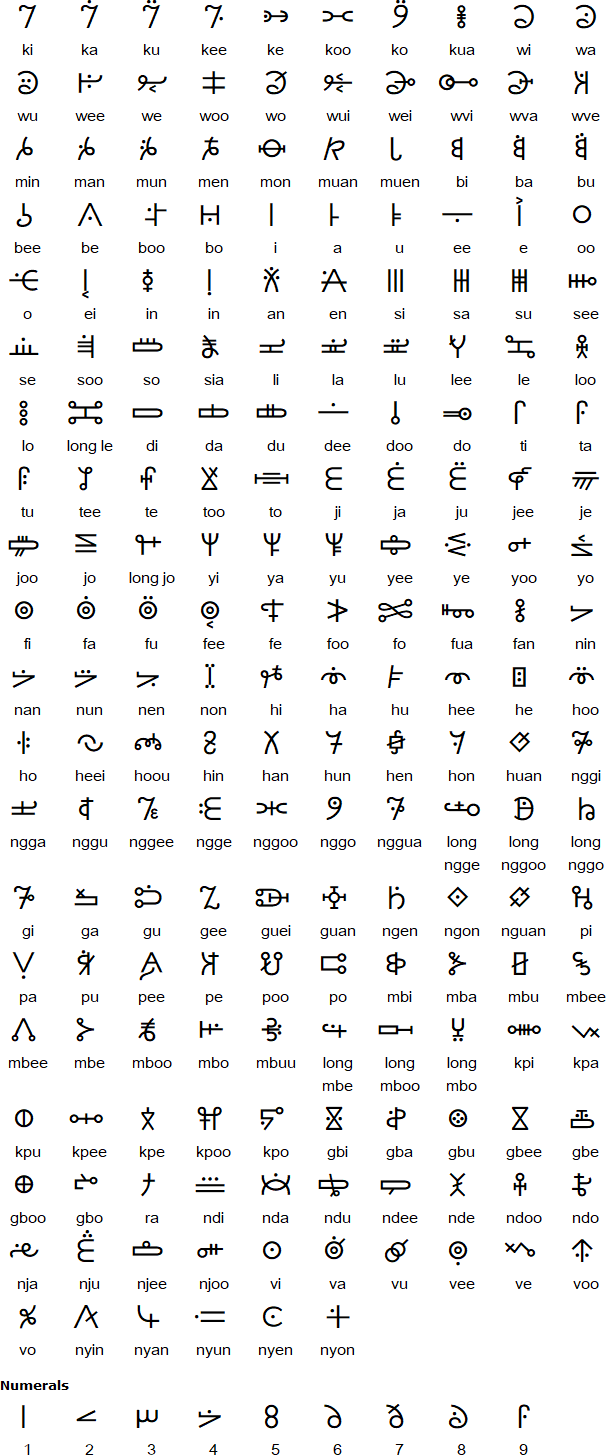The Mende syllabary was invented in 1921 by Kisimi Kamara (ca. 1890-1962) of Sierra Leone. Seeing how the British managed to take over his country, Kisimi concluded that their power was partly a result of their literacy. He decided to give his own people that ability. Kisimi claimed he was inspired in a dream to create the Mende syllabary, which he called Ki-ka-ku. During the 1920s and 1930s he ran a school in Potoru to teach Ki-ka-ku. The syllabary became a popular method of keeping records and writing letters.
During the 1940s the British set up the Protectorate Literacy Bureau in Bo with the aim of teaching the Mende people to read and write with a version of the Latin alphabet. As a result, usage of Kisimi's syllabary gradually diminished and it was eventually forgotten.

Download an alphabet chart for the Mende Kikakui script (Excel)

Numuvuisia Kpɛlɛɛ ta ti le tɛ yɛ nduwɔ ya hu, tao ti nuvuu yei kɛɛ ti lɔnyi maa hɛwungɔ. Kiiya kɛɛ hindaluahu gɔɔla a yɛlɔ ti hun. Fale mahoungɔ ti ti nyɔnyɔhu hoi kia ndeegaa.
All human beings are born free and equal in dignity and rights. They
are endowed with reason and conscience and should act towards one another in a spirit of brotherhood.
(Article 1 of the Universal Declaration of Human Rights)
Information about the Mende script
https://en.wikipedia.org/wiki/Mende_Kikakui_script
https://www.jstor.org/stable/1771691
Fonts for Mende
http://athinkra.github.io/mende-kikakui/
https://en.fontke.com/font/153974250/
Afaka, Bamum, Caroline Island Script, Celtiberian, Cherokee, Cypriot, Dunging (Iban), Eskayan, Hiragana, Iberian, Katakana, Kpelle, Loma, Mende (Kikakui), Mwangwego, Nüshu, Nwagụ Aneke, Vai, Yi, Yugtun
Page last modified: 15.03.23
[top]
You can support this site by Buying Me A Coffee, and if you like what you see on this page, you can use the buttons below to share it with people you know.

If you like this site and find it useful, you can support it by making a donation via PayPal or Patreon, or by contributing in other ways. Omniglot is how I make my living.
Note: all links on this site to Amazon.com, Amazon.co.uk
and Amazon.fr
are affiliate links. This means I earn a commission if you click on any of them and buy something. So by clicking on these links you can help to support this site.
[top]